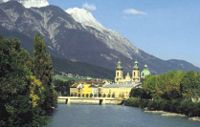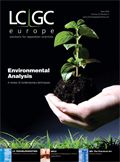Event News
Euroanalysis 2009, which is organized under the umbrella of the Division of Analytical Chemistry (DAC) of the European Association for Chemical and Molecular Sciences (EuCheMS), has become a premier event for scientists to discuss and hear presentations on a broad spectrum of analytical techniques from a diverse range of applications. Euroanalysis aims to bring together analytical chemists from various fields to stimulate communication and strengthen networks in analytical sciences.
EUROANALYSIS 2009
Euroanalysis 2009, which is organized under the umbrella of the Division of Analytical Chemistry (DAC) of the European Association for Chemical and Molecular Sciences (EuCheMS), has become a premier event for scientists to discuss and hear presentations on a broad spectrum of analytical techniques from a diverse range of applications. Euroanalysis aims to bring together analytical chemists from various fields to stimulate communication and strengthen networks in analytical sciences.

Euroanalysis 2009 will be the fifteenth event in this series of conferences and will take place in Innsbruck, Austria, 6–10 September 2009. The conference will highlight current trends in all areas of analytical chemistry and demonstrate the key role of analytics for progress in science and technology. According to the motto "The Impact of Analytical Chemistry on Quality of Life" special emphasis will be given to the analysis in — and of — biological systems and ecological systems, bridging cutting-edge technology with demanding analytical problems. Furthermore, a special session will be devoted to Education in Analytical Chemistry.
The scientific programme will consist of invited plenary and keynote lectures as well as oral contributions in parallel sessions and poster presentations. Submissions of contributions to the following areas are welcome: Advances in Fast Analysis — Analysis for Sustainable Chemistry — Bioanalytics — Clinical Analysis — Education and E-Learning in Analytical Chemistry — Electroanalysis — Environment and Health — Food Quality and Analysis — Hyphenation and Multidimensional Techniques — Industrial Aspects — Mass Spectrometry and Spectroscopic Techniques — Material Properties and Analytics — Nanoanalytics — Process Analysis Technologies (PAT) — REACH — Sample Preparation — Sensor Technologies — Separation Science.
An international exhibition on instrumentation and services related to analytical sciences will form an integral part of the programme.
Half-day and full-day short courses will be offered in the areas of sample preparation, near infrared spectroscopy, quality of measurements, pattern recognition and experimental design. Participants will receive an official certificate.
Euroanalysis 2009 will take place in the convention centre Congress Innsbruck, which is close to the famous Old Town of Innsbruck. The city combines pulsating modern life with historic charm in the heart of the Alps. It is one of the main tourist attractions in Austria. Attendees from academia, industry and government research institutions are invited to participate in Euroanalysis 2009 and to take advantage of this forum for scientific exchange and networking.
Deadlines
Abstract submission: 30 April 2009 for oral contributions, 31 May 2009 for poster contributions (abstract submission must be done via the web-site of the conference).
Registration: 1 August 2009 for registration at reduced fees (€480 for regular participants, €230 for students).
Hotel reservation: 1 August 2009.
Website: www.euroanalysis2009.at
E-mail (for participants): euroanalysis2009@come-innsbruck.at
E-mail (for exhibitors): ralph@medex.co.at
24 April 2009
"SFC for Pharmaceutical Analysis — Opportunity or Challenge?"
Robens Suite, Guy's Hospital Tower, London
Organizer: Royal Society of Chemistry Chromatography and Electrophoresis Group
Contact: Dr Melissa Hanna-Brown
E-mail: melissa.hanna-brown@pfizer.com
Website: www.rsc.org
11–15 May 2009
ACHEMA 2009
Frankfurt am Main
Organizer: DECHEMA eV
Address: PO Box 15 01 04, 60061 Frankfurt am Main, Germany
Tel.: +49 69 7564 0
Fax: +49 69 7564 201
E-mail: achema@dechema.de
Website: www.achema.com
13–14 May 2009
Chromatographic Society Spring Symposium & AGM
Stadium of Light, Sunderland, UK
Organizer: The Chromatographic Society
Address: Jordanhill Campus, 76 South Brae Drive, Glasgow, G13 1PP, UK
Tel.: +44 141 434 1500
Fax: +44 141 434 1519
E-mail: chromsoc@meetingmakers.co.uk
Website: www.chromsoc.com
22–23 July 2009
SFC 2009
Radisson Plaza-Warwick Hotel, Philadelphia
Organizer: Green Chemistry Group
Address: P.O. Box 169, Oakmont, Pennsylvania 15139, USA
Tel.: +1 412 805 6296
Fax: +1 412 967 9446
E-mail: info@greenchemistrygroup.org
Website: www.greenchemistrygroup.org
Send your event details to dkitson@advanstar.com

HPLC 2025 Preview: Fundamentally Speaking (Part 1)
May 13th 2025Michael Lämmerhofer from the Institute of Pharmaceutical Sciences, University of Tübingen, Germany, spoke to JFK Huber Lecture Award winner of 2024 Torgny Fornstedt, professor in analytical chemistry and leader of the Fundamental Separation Science Group, Karlstad University, Sweden, about his pioneering work in high performance liquid chromatography (HPLC) with a focus on fundamentals and industrial applications.
Reversed-Phases for LC Deliberately Doped with Positive Charge: Tips and Tricks for Effective Use
May 13th 2025In this month's edition of LC Troubleshooting, Dwight Stoll and his fellow researchers discuss both the benefits (improved peak shape/loading) and challenges (excessive interaction) associated with charge-doped reversed-phase (RP) columns for both analytical and preparative separations.
Determining Ways to Protect Honeybee Colonies with GC–MS
May 13th 2025A study conducted by the Agriculture Research Centre of Giza, Egypt, and Jilin Agricultural University in China, evaluated the efficacy of stinging nettle extract, nettle smoke, and formic acid in the controlling of Varroa mites, a major threat to honeybee colonies, with a focus on mite infestation reduction, honeybee mortality, and biochemical responses. Gas chromatography–mass spectrometry (GC–MS) was used to identify key bioactive compounds in the stinging nettle extract.

.png&w=3840&q=75)

.png&w=3840&q=75)



.png&w=3840&q=75)



.png&w=3840&q=75)











